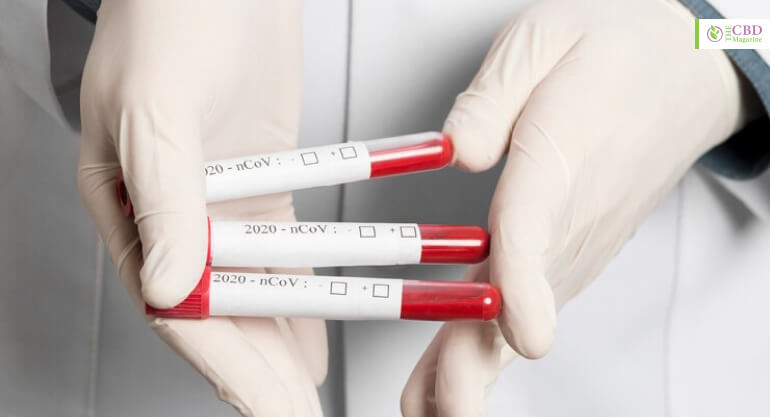Samik has been a literature student all along and uses…
Can you donate plasma if you smoke weed? If this is what you want to know, then this is the article that you should be looking out for. I have taken my time and brought forth some of the most important aspects of cannabis usage and donation of plasma. Stick around to know everything about the discussion.
Blood Transfusion Overview

Blood transfusion is one of the most common forms of medical procedure in existence. The process is when an individual is given blood or blood components externally.
The administered blood is usually taken from a donor with a compatible blood type. Blood for transfusion is usually taken from blood banks or active donors who donate blood on the spot.
Blood donation is usually an intravenous line or an IV line. It is not a serious or risky procedure, but there are some minor risks that are involved. We will discuss those later in this article, asking the serious question: can you donate plasma if you smoke weed? Stick around to know more.
Types Of Blood Transfusion
While the procedure sounds fairly simple and hassle-free, however, it cannot be classified into a singular procedure. According to the American Red Cross, blood transfusions can be broadly divided into three different forms. These include:
- Red Blood Cell transfusions: Red blood cells are one of the components of blood. This component is one of the most important components of blood. Some of the leading causes of RBC administration include anemia, a disease caused by a deficiency of iron in the blood. This is also administered to people who suffer from other blood disorders as well.
- Platelet Transfusion: This form of transfusion is usually administered to people who have a low platelet count. Leading causes of platelet transfusion are thrombocytopenic, disseminated intravascular coagulation, infections, bacterial growth, etc. Chemotherapy is another disease that can lower platelet counts.
- Plasma transfusion: The next on our list is Plasma transfusion. Plasma is made up of protein and other components that are important for the general well-being of blood. It is one of the leading treatments for people who have experienced severe burns. Liver failure is another reason that demands plasma transfusion. Today, we will primarily try to answer, “can you donate plasma if you smoke weed?”
- Whole Blood transfusion: This is the most common and easiest form of transfusion. In the aforementioned procedures, medical practitioners have to extract specific components of blood and then administer them as needed. The leading cause of whole blood transfusion could be injury or hemorrhage.
Each of these forms of transfusion requires specific parameters and conditions to work successfully. Let us dive a little deeper into understanding blood transfusions from a close perspective. This will also help our understanding of “can you donate plasma if you smoke weed.”
Blood Types
In order to effectively understand transfusion, you need to understand that transfusion can only succeed if some of the parameters match. One of the biggest parameters that medical practitioners need to take care of is the blood type.
There are four primary types of blood. Howevevr, each blood type has positive and negative variants. Therefore, there are eight different types of blood. Here is a detailed list of all the important blood types.
- A +
- A –
- B +
- B –
- AB +
- AB –
- O +
- O –
Apart from these mentioned blood types, there are two more blood types, namely ABO and RH blood types. These blood types have been discovered recently.
Wrong blood transfusion can produce a reaction called the Hemolytic transfusion. In this reaction, your white blood cells start attacking the wrong variant of blood as foreign material, and this can collapse several of your organs and cause fatal reactions.
Why Is Blood Transfusion Necessary?

Blood transfusion is one of the most common medical procedures out there. This could be because of a myriad of reasons like injury, accident, etc. Apart from this, blood transfusions can also be used in order to deal with certain conditions. Here is a detailed rundown of some of the most prominent diseases that require a blood transfusion. Like:
- Anemia: This is a condition where the individual who is down with this sickness does not have enough red blood cells. This could either be because of genetics or poor diet. Anemia is primarily due to low iron content in the blood.
- Hemophilia: This is a genetic disorder where blood does not clot. As a result, the person might bleed to death. The primary cause of this disease is deficiency of clotting factors VIII and IX. Some of the most common signs of Hemophilia are spontaneous nose bleeding, bruising, and blood in urine or feces.
- Cancer: This disease is related to the abnormal multiplying of cells due to mutation. Cancer can be of several types. As of now, there is no cure for cancer. There are only a few deterrents, and one of them is chemotherapy. Patients of chemotherapy need daily blood transfusions to counter the effects of chemotherapy.
- Sickle Cell Disease: Sickle cell disease is a weird disease that changes the very shape of red blood cells. This can affect the blood flow. The sickle-shaped blood cells will get stuck to the walls of cardiovascular tissues and cause clots. This can also affect oxygen transmission throughout the body.
Risk & Side-Effects Of Blood Transfusion

Blood transfusion is one of the most common medical procedures. However, it is not 100% safe. There are several side effects and risks that involve blood transfusion. Here are some of the most prominent side effects of blood transfusion.
Allergies
Allergic reactions could be one of the most common side effects of blood transfusion. As per the Centers for Disease Control and Prevention or CDC, allergic reactions are the most common form of side effects. CDC reports that allergic reactions make up for 50% of transfusion complications.
Fever
Another very common form of allergic reaction to blood transfusion is low-grade fever. Fever is a common after-effect of blood donation. Most of the time, this reaction is manageable. However, if individuals demonstrate chest pain and nausea, then the situation is grave. He or she needs to be taken to the ER immediately.
Hemolytic Reaction
As has already been discussed, if a user receives the wrong blood type, they will go through a Hemolytic Reaction. This is an extremely serious side effect that can even be fatal. As a result, medical practitioners take special care not to mess up the blood type. Some of the most prominent symptoms of a hemolytic reaction include chest pain, dark urine, high fever, nausea, and lower back pain.
Transmission Of Infections
Nowadays, blood samples have to go through several levels of screenings before they can be cleared for transfusion. Earlier, this was not the case. As a result, several infections were transmitted via blood transfusions.
Basic Requirements Of Plasma Transfusion

One of the biggest questions every marijuana user thinks about is whether it is safe for somebody to consume cannabis and donate plasma at the same time. Recreational and medical users wonder, ‘Can you donate plasma if you smoke weed?’. Hence, in this section, we will look at some of the basic requirements that an individual needs to fulfill in order to donate plasma.
General Requirements
In the USA, a donor has to go through an extensive medical screening. He or she has to be in good health, devoid of any blood-related diseases, and at least 17 years of age. Meanwhile, secondary factors include the height and weight of the individual. He or she has to be at least 5’ 1” in height and must weigh more than 130 pounds. However, females have a higher age requirement than. In usa, a female has to be at least 19 years of age in order to be allowed to donate blood.
Platelet Donation
As for platelet donation, a male donor has to be at least 17 years of age, and a female has to be at least 19 years of age. Subsequently, donors cannot be on any kind of blood thinners. Furthermore, pregnant women cannot donate platelets. This is because pregnant females create more antibodies than normal human beings. This can really mess with the system of the person who is receiving the blood.
Disqualifying Factors

As is apparent from the aforementioned section, there are several disqualifying factors that come into play when we are talking about plasma donation. However, none of these disqualifying factors involve cannabis. In other words, cannabis does not affect your blood in a way that you cannot donate blood.
So, if you ask the question, “can you donate plasma if you smoke weed?” The answer is “Yes.” However, this does not mean that you can show up inebriated. Even if you do, you will be immediately turned away.
Plasma Transfusion And Synthetic Cannabis

Currently, synthetic cannabis dominates the cannabis market in the USA. Synthetic marijuana, also known as Spice or K2, is a chemical concoction of synthetic cannabinoids. While most studies claim that Spice is generally safe. Some users believe that it can really catalyze carcinogenic effects.
A recent study conducted about a year back claimed that synthetic weed radically mutates the endocannabinoid system. As a result, synthetic cannabis can pose a challenge for blood donation.
This is primarily because synthetic cannabinoids react very differently. As a result, medical practitioners will not allow you to donate blood if they find synthetic cannabis metabolites. However, the FDA and Red Cross do not explicitly talk about banning synthetic cannabis in any way whatsoever.
Are Drug Screenings Mandatory Before Transfusion?

Cannabis connoisseurs have a misconception that blood donation centers do a mandatory drug screening to point out cannabis users. However, this is far from the truth. Even though some recipients might demand a mandatory drug screening. Most blood transfusion camps do not conduct any sort of drug screening. Hence, you do not have to worry about any screenings.
Ethical & Legal Aspects That You Need To Consider

Whenever you are talking about cannabis and other psychoactive substances, you need to consider the legal and ethical aspects of it. So before you can donate your plasma, you need to understand the legal and ethical aspects of it.
Current cannabis law does not ban users from donating blood or blood components. However, you can run into legal trouble for using it. Even though cannabis is a decriminalized substance, it has not received the green light for recreational usage.
As per the ethical aspect of the whole thing, cannabis users need to come forth with their use patterns and let the receiver know about their cannabis habit. This will keep everybody on the same page and will also help doctors to tackle the issue with more clarity and content.
End Note: Can you Donate Plasma If You Smoke Weed
So, can you donate plasma if you smoke weed? The answer is an unapologetically yes. You can donate plasma and other blood components if you are a regular cannabis user. However, there are some legal and ethical aspects that you need to understand in order to know the discussion completely.
Additional Reading:
Samik has been a literature student all along and uses his fluidity to write about multi-niche topics. Aspiring to be a professional writer, he tries to analyze his topic from a critical standpoint but still adds a hint of personal perspective to the end product. Being a person having a general inclination toward global politics and documentary filmmaking, he also wishes to write and document more about numerous conflicts that are brewing in the different corners of the globe.









